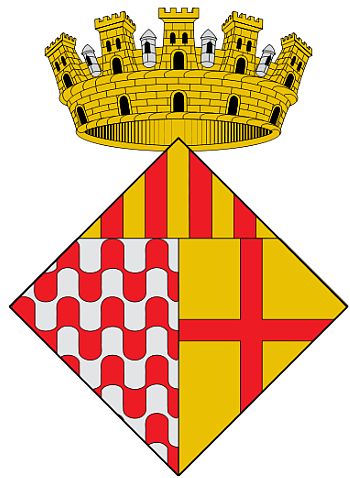Sant Feliu de Guíxols: Difference between revisions
Knorrepoes (talk | contribs) No edit summary |
Knorrepoes (talk | contribs) m (Text replace - "[[Literature" to "{{media}} [[Literature") |
||
| Line 19: | Line 19: | ||
The three partitions represent the historical Concòrdia de Roses (Roses Agreement) of 1354, between the count-king Pere III (the royal arms of Catalonia-Aragon, four pales Gules on Or), the city of Girona (the vairy Argent on Gules) and the monastery of Sant Feliu de Guíxols (the cross Gules on Or). | The three partitions represent the historical Concòrdia de Roses (Roses Agreement) of 1354, between the count-king Pere III (the royal arms of Catalonia-Aragon, four pales Gules on Or), the city of Girona (the vairy Argent on Gules) and the monastery of Sant Feliu de Guíxols (the cross Gules on Or). | ||
{{media}} | |||
[[Literature]] : Image taken from Wikipedia; background from Enric Fontvila, Barcelona. | [[Literature]] : Image taken from Wikipedia; background from Enric Fontvila, Barcelona. | ||
Revision as of 05:33, 9 July 2014
| Heraldry of the World Civic heraldry of Spain - Heraldica Española |
SANT FELIU DE GUÍXOLS
Region : Catalonia
Province : Girona
Official blazon
Escut caironat partit: 1r. vairat antic (o d'ondes) d'argent i de gules; 2n. d'or, una creu plena de gules; al tot un cap d'or amb 4 pals de gules. Per timbre una corona mural de ciutat.
Origin/meaning
These arms have been officially granted on 7th July 1983.
The three partitions represent the historical Concòrdia de Roses (Roses Agreement) of 1354, between the count-king Pere III (the royal arms of Catalonia-Aragon, four pales Gules on Or), the city of Girona (the vairy Argent on Gules) and the monastery of Sant Feliu de Guíxols (the cross Gules on Or).
Contact and Support
Partners:
Your logo here ?
Contact us
© since 1995, Heraldry of the World, Ralf Hartemink 
Index of the site
Literature : Image taken from Wikipedia; background from Enric Fontvila, Barcelona.











